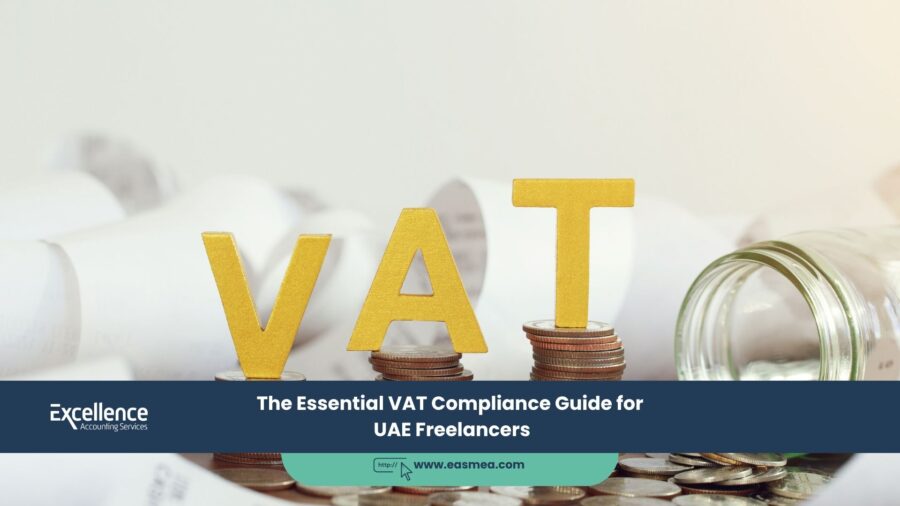The Essential VAT Compliance Guide for UAE Freelancers
The rise of the gig economy has transformed the UAE’s professional landscape, with thousands of talented individuals embracing the freedom and flexibility of freelancing. As a freelancer, you are your own boss, your own marketing department, and your own CEO. You are also your own finance department, and with that comes a responsibility that many independent professionals overlook until it’s too late: Value Added Tax (VAT) compliance.
- The Essential VAT Compliance Guide for UAE Freelancers
- Part 1: The First Hurdle - Do I Need to Register for VAT?
- Part 2: The Art of Compliant Invoicing
- Part 3: Impeccable Record-Keeping - Your Best Defense
- Part 4: Filing Your VAT Return - A Freelancer's Walkthrough
- Part 5: Advanced Topics for the Savvy Freelancer
- How Excellence Accounting Services (EAS) Empowers Freelancers
- Frequently Asked Questions (FAQs) for Freelancers
- Focus on Your Craft, Not Your Taxes.
Since its introduction, VAT has become an integral part of doing business in the UAE. For freelancers, it’s a topic often shrouded in confusion. When do I need to register? How do I issue a proper tax invoice? What expenses can I claim VAT on? Ignoring these questions is not an option. Non-compliance with the Federal Tax Authority (FTA) can lead to severe penalties that can cripple a burgeoning freelance career. This guide is designed to be your definitive resource, a step-by-step manual that demystifies VAT for the independent professional. We will cover everything from the registration threshold to filing your first return, empowering you to manage your tax obligations with the same professionalism you bring to your clients.
Key Takeaways for Freelancer VAT Compliance
- The Magic Number is AED 375,000: You must register for VAT if your taxable turnover in the last 12 months (or the next 30 days) exceeds this amount.
- Record-Keeping is Non-Negotiable: You are legally required to maintain accurate financial records, including all invoices and receipts, for at least five years.
- Invoicing Requires Precision: Once registered, you must issue compliant Tax Invoices for your services, which have specific mandatory fields.
- Overseas Software Means RCM: If you use services from outside the UAE (like Adobe, Google Workspace, or foreign freelancers), you must account for VAT under the Reverse Charge Mechanism.
- Claim What You’re Owed: As a registered freelancer, you can recover VAT on your legitimate business expenses, reducing your overall tax bill.
Part 1: The First Hurdle – Do I Need to Register for VAT?
The most pressing question for any freelancer is whether they even need to enter the VAT system. The answer is determined by your turnover—the total value of your taxable supplies.
Understanding Your “Taxable Supplies”
As a freelancer, almost everything you charge for is a taxable supply. This includes:
- Consulting fees
- Project-based work (e.g., graphic design, writing, web development)
- Retainer fees
- Commission income
The VAT Registration Thresholds
There are two key thresholds to be aware of:
- Mandatory Registration Threshold: AED 375,000. If your total taxable supplies in the previous 12 months have exceeded this amount, or you anticipate they will in the next 30 days, you must register for VAT. This is not optional. The 12-month period is a “rolling” basis, meaning you should always be looking at the last 12 months, not just the calendar year.
- Voluntary Registration Threshold: AED 187,500. If your taxable supplies in the last 12 months have exceeded this amount (but are still below the mandatory limit), you have the option to register for VAT.
Pros and Cons of Voluntary Registration
| Pros | Cons |
|---|---|
| Enhanced Credibility: A TRN can make you appear as a more established and serious business, especially to larger corporate clients. | Administrative Burden: You must comply with all VAT rules, including issuing tax invoices and filing regular returns. |
| VAT Recovery: You can reclaim the VAT you pay on your business expenses (laptops, software, etc.), which you cannot do if you’re unregistered. | Price Increase: You must add 5% VAT to your prices, which could make you more expensive for clients who are not VAT-registered themselves (e.g., individuals). |
The decision to register voluntarily requires careful consideration of your client base and your level of business expenses. Expert business consultancy can help you make the right choice.
Part 2: The Art of Compliant Invoicing
Once you are VAT-registered, your invoicing process must change. You can no longer send a simple, informal invoice. You must issue a legally compliant Tax Invoice.
Mandatory Components of a Tax Invoice
- The words “Tax Invoice” clearly displayed.
- Your name (or company name), address, and Tax Registration Number (TRN).
- Your client’s name, address, and TRN (if they are registered).
- A unique, sequential invoice number.
- The date the invoice is issued and the date the service was supplied.
- A clear description of the services you provided.
- The price per unit, the quantity, the sub-total (amount before VAT).
- The VAT rate (5%) and the total amount of VAT charged in AED.
- The final, total amount payable in AED.
Failure to issue a compliant tax invoice can result in penalties and may prevent your client from being able to recover the VAT you charged them.
Part 3: Impeccable Record-Keeping – Your Best Defense
The FTA requires all registrants to maintain comprehensive business records for a minimum of five years. For a freelancer, this means keeping a file for:
- All Tax Invoices you have issued to clients.
- All Tax Invoices you have received from suppliers for your expenses.
- All bank statements related to your freelance work.
- Contracts, proposals, and statements of work with clients.
- Customs declarations for any goods you import.
Trying to manage this with spreadsheets and shoeboxes of receipts is a recipe for disaster. This is where a simple, cloud-based accounting solution like Zoho Books is a game-changer for freelancers. It allows you to create compliant invoices, track expenses, and have all your records organized and ready for your VAT return filing. It provides a clear audit trail that will satisfy any FTA inspection.
Part 4: Filing Your VAT Return – A Freelancer’s Walkthrough
Typically, you’ll need to file a VAT return every quarter. The return summarizes all the VAT you’ve collected (output tax) and all the VAT you’ve paid on expenses (input tax).
Net VAT Position = Total Output Tax – Total Recoverable Input Tax
If the result is positive, you pay that amount to the FTA. If it’s negative (you’ve paid more VAT than you’ve collected), you are due a refund.
Key Steps for Filing:
- Gather Your Records: Collate all your sales invoices and expense invoices for the period.
- Calculate Total Output Tax: Add up the VAT you charged on all your sales.
- Calculate Total Recoverable Input Tax: Add up the VAT you paid on all eligible business expenses (more on this below).
- Log into the EmaraTax Portal: Access the FTA’s online portal to complete the VAT 201 form.
- Complete and Submit: Fill in the required boxes with your calculated totals.
- Pay Any Liability: Make the payment before the deadline, which is the 28th day of the month following the end of the tax period.
Part 5: Advanced Topics for the Savvy Freelancer
1. The Reverse Charge Mechanism (RCM)
As a freelancer, you likely use services from companies based outside the UAE. Common examples include:
- Software subscriptions (e.g., Adobe Creative Cloud, Microsoft 365, Canva Pro)
- Digital advertising (e.g., Google Ads, LinkedIn Ads)
- Hiring an overseas subcontractor or virtual assistant
When you buy these services, the foreign supplier won’t charge you UAE VAT. Instead, you are required to account for the VAT yourself under the Reverse Charge Mechanism. You calculate the 5% VAT, declare it as output tax, and simultaneously claim it back as input tax on the same return. While often cash-flow neutral, failing to declare it is a compliance breach.
2. Recovering VAT on Your Expenses
One of the biggest benefits of being VAT-registered is the ability to recover VAT on your business costs. For a freelancer, this can include:
- Purchase of a new laptop or computer equipment.
- Software subscriptions and licenses.
- Co-working space membership fees.
- Business mobile phone bills.
- Marketing and advertising costs.
- Professional fees (e.g., for an accountant or lawyer).
It’s crucial to have a dedicated accounting and bookkeeping system to track these expenses accurately.
How Excellence Accounting Services (EAS) Empowers Freelancers
Navigating VAT while juggling clients and projects can be overwhelming. EAS acts as your dedicated finance partner, providing tailored services that let you focus on what you do best.
- Hassle-Free VAT Registration: We handle the entire VAT registration process for you, ensuring it’s done correctly and on time.
- Freelancer-Focused Bookkeeping: We can manage your bookkeeping using modern tools, ensuring your records are always organized and audit-ready.
- Timely VAT Return Filing: We take the stress out of filing by preparing and submitting your quarterly VAT returns accurately, ensuring you claim all eligible input tax.
- Strategic Advice: From deciding on voluntary registration to understanding the tax implications of your contracts, our VAT consultants provide the clarity you need.
Frequently Asked Questions (FAQs) for Freelancers
Yes. To register for VAT, you need to be recognized as conducting a business in the UAE. This typically requires a valid trade license or freelance permit issued by a relevant authority (e.g., a free zone or the Department of Economic Development).
Once you are registered, you must remain registered and continue to comply with all VAT obligations, even if your turnover temporarily drops. You can only apply for de-registration if your turnover in the preceding 12 months falls below the voluntary threshold (AED 187,500) and you don’t expect to exceed it in the next 30 days.
This is complex. You can only claim the portion of VAT that relates strictly to the business use of your home. You need a clear and defensible method to apportion the cost between business and personal use (e.g., based on the floor area of your dedicated office space). This is a high-risk area in an audit, and meticulous records are required.
Generally, no. The supply of services to a recipient whose place of residence is outside the GCC is typically zero-rated, meaning you charge VAT at 0%. However, you must have evidence that your client is based outside the GCC (like a contract or passport copy) and you must still report this 0% sale on your VAT return.
The FTA imposes strict penalties. There is a late filing penalty (AED 1,000 for the first time) and a late payment penalty, which is a percentage of the unpaid tax and increases over time. Prompt filing and payment are crucial.
You must act immediately. You should apply for VAT registration with a back-dated effective date. The FTA will impose a late registration penalty (AED 20,000). You will also be liable to calculate and pay the VAT you *should* have collected from your clients since your required registration date. Seeking professional help from a tax advisor is highly recommended in this situation.
It depends on your clients. If you primarily work with large, VAT-registered businesses, they expect to see a tax invoice and can recover the VAT, so it doesn’t affect their cost. In this case, registering allows you to recover your own input VAT, making it beneficial. If you work mainly with private individuals, adding 5% VAT makes you more expensive, so it may be better to wait for mandatory registration.
For most freelancers, it has no cash flow impact. When you account for RCM on a AED 100 software subscription, you declare AED 5 as output tax and claim AED 5 as input tax on the same return. The two cancel each other out. It’s purely a reporting requirement to ensure the FTA knows that tax is due on that imported service.
For a freelancer, your services will almost always be taxable (either standard-rated at 5% or zero-rated). The key difference is in VAT recovery. If a service is zero-rated (like an export), you can still claim back the VAT on all your related expenses. If a service were exempt (which is rare for freelancers), you could not claim back the VAT on related expenses.
While not a strict legal requirement for VAT, it is highly recommended and considered best practice. A separate business bank account makes record-keeping significantly easier, creates a clear audit trail, and helps you accurately track your turnover for the registration threshold. It simplifies the entire account reconciliation process.
Conclusion: Treating Your Freelance Career Like a Business
VAT compliance is a clear indicator that you are treating your freelance practice as a serious, professional business. While the rules may seem daunting at first, they are manageable with the right knowledge and processes. By understanding your obligations, implementing a robust system for invoicing and record-keeping, and seeking professional advice when needed, you can navigate the UAE’s tax landscape with confidence. This frees you up to focus on what you do best: delivering exceptional value to your clients and building a successful independent career.




